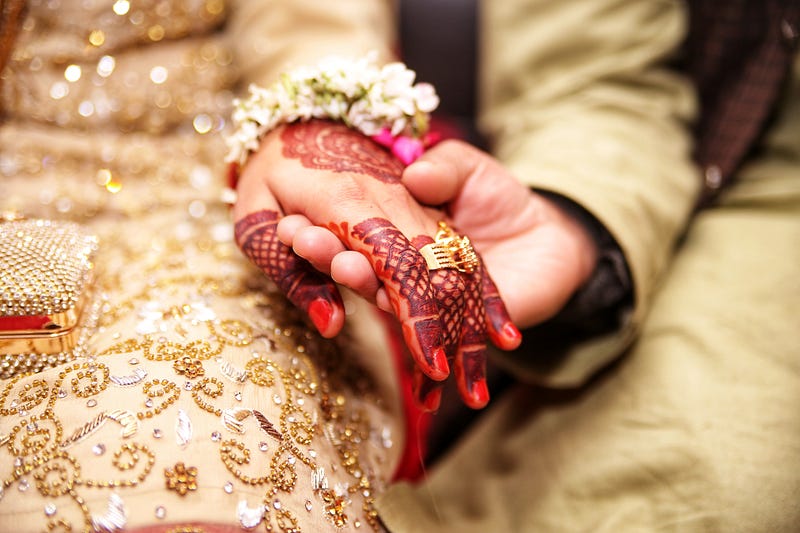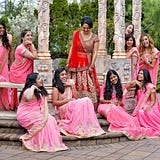Why in India, it’s Socially Acceptable to Trade a Man’s Wealth for a Woman’s Looks
The ecosystem of shame created by Indian arranged marriages

The ecosystem of shame created by Indian arranged marriages
My friend is headed towards disaster. I can do nothing to stop it.
Arohan (name changed) is a 28-year-old entrepreneur. He comes from a Marwari (an Indian ethnic group originally from Rajasthan) family where it’s normal to marry and “settle down” by 23.
At his age, Arohan should’ve had two kids.
But he was busy building his business from scratch. In his younger years, he worked so hard, he barely had time to look for a potential alliance. And now that he’s finally open to the idea of marriage, he’s considered “too old.”
Add to that the fact that most women he met have turned him down on the grounds that he’s neither conventionally good-looking nor a multi-millionaire, his self-esteem is at an all-time low.
Arohan’s parents are getting desperate for him to marry. His extended family has started questioning his character (Ladke me much to kami hogi — there must be something wrong with him, or else, why is he still unmarried?). After facing so many rejections from women, his confidence is reduced to bits.
At this point, he no longer cares who the woman is or how she’s like as a person. As long as she’s willing to marry him, he’s ready to settle down. That’s what I mean when I say my friend is headed towards disaster. And I can’t do anything to stop him.
Deciding A Person’s Worth
In the Indian arranged marriage system, a man’s worth is defined by his educational qualifications and how much he earns. If he’s older than what’s considered “marriageable age,” he’ll be judged more harshly. Questions like, “If you worked so hard for so many years, why don’t you have the millions to show?” are common. The judgment gets less harsh when looks are factored in. I imagine a traditionally handsome man might have it easier. Even if he’s a failure, at least, he’s a good-looking failure.
For women, her qualifications aren’t even considered. All that’s expected of her is that she should be “fair, slim, and beautiful”. A study comparing 823 Indian matrimonial ads found that only 35% of men stated that their future wives should either be ‘educated’, ‘well educated’, or ‘graduate’. For the rest, the only emphasis was on looks.
“…the personal attributes most frequently highlighted in our data set of matrimonials were ‘good-looking’, ‘beautiful’, and ‘slim’ to describe both advertised and targeted brides; and ‘handsome’, ‘tall’, and with ‘clean/ good habits’ to describe both advertised and targeted grooms.”
The deliberate use of complexion adjectives indexes fair skin as a visible marker of identity that’s socially desired. Another study compiling data from 1065 matrimonial ads from two popular newspapers in India established that in India, it’s socially acceptable to exchange men’s financial stability for women’s physical attractiveness.
Worth on Paper vs Self-Worth
On paper, Arohan’s credentials almost doom him to never find happiness. But in person, I know he’s a wonderful soul. He’s incredibly hard-working, open-minded, and has an amazing sense of humour. Any woman would be lucky to have him — if only she’s willing to look past the insane standards of looks and wealth the society has established for her.
Had it been a fair world, Arohan shouldn’t have considered himself a failure at all. But after passing through the mesh of greed and shame the Indian arranged marriage scene has created, he’s started second-guessing his every move, questioning even his achievements.
After all, how long can a person run on self-motivation if the world constantly keeps telling them they have failed?
In truth, Arohan isn’t a failure. It’s the society that has failed him.
I wish he could see this. I wish someone would offer him an alternate explanation.
The Dangers of “Settling”
At its heart, the arranged marriage scene is valuable — because it’s a way for people to find partners, even those who are too caught up in work to look for an alliance themselves. But the way it’s been executed through the years is materialistic and designed to make people feel inferior.
By focusing so much on the desirable qualities, the demands for marriage highlight what’s lacking in people. The stigma can get so bad, that women who aren’t fair, slim or beautiful (and men who aren’t well-settled, rich, and handsome) might start thinking of themselves as “not deserving happiness.”
This can lead to the dangerous spiral where they will settle for just about anyone who agrees to marry them, regardless of how much the other person abuses them. According to Psychology Today, settling means letting go of things that are important to who you are, what you believe in, how you would like to be treated and loved. In such an unfair tradeoff, the person with low self-esteem may always be made to feel that they aren’t enough.
A recent study found that people who are afraid of being single are more likely to prioritise being in a relationship over the quality of that relationship or a potential partner. While you might think this is a sustainable trade-off, and for such people, being in any relationship is better than being single, even in the long run. However, the researchers established that the participants in bad relationships were just as likely to be depressed and lonely as the participants who were single.
Final Words
I’m not against the arranged marriage system. I’ve seen two close friends carefully combing through scores of matrimonial ads and finding the love of their lives. Of course, you can find love anywhere, and the arranged marriage scene is just another way to find a partner in this increasingly isolating world. But Arohan’s story breaks my heart. If a person has a good heart and is kind, compassionate and willing to take you for who you are, don’t they deserve happiness?
Does the process have to be so humiliating, prejudiced and objectified?
I have hope that as the mentality of the society evolves, the growth will reflect on the demands of the Indian arranged marriage scene as well. That with time, they will stop focusing on superficial attributes like looks and start emphasising what would be more important in the long run: life-goals, plans for children, and lifestyle.


Join my email list to get a thought-provoking story for FREE each week
